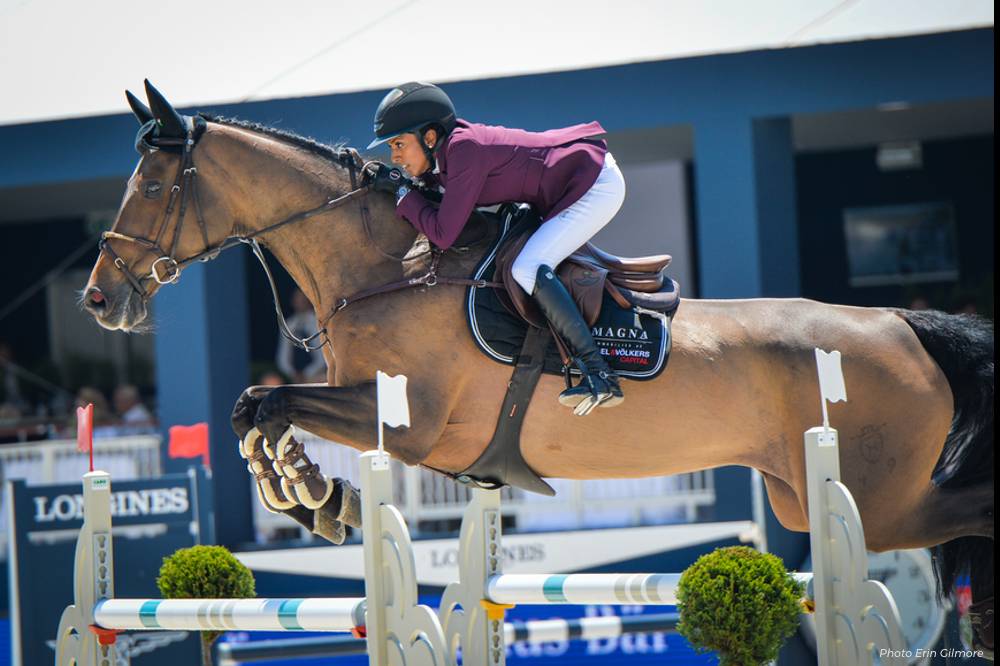Let The Tokyo 2020 Controversies Begin: Part 2

An Olympic hopeful rises to the top of her sport to qualify for her first ever Games and becomes an instant pathfinder for her nation – the first athlete in her sport to carry her country’s flag at an Olympics. Headlines and a splashy media blitz follow. The country rises behind the athlete to excitedly promote her journey and the people of the country are abuzz. But just as soon as it began, the athlete is delivered the news that her qualification points don’t count, and her Olympic spot is taken away.
If only it were that simple when it came to the case of Sri Lankan-born, Swedish raised athlete and show jumping rider Mathilda Karlsson. The petite, 36-year-old rider was born in Sri Lanka and adopted by Swedish parents. Long a fixture on the LGCT circuit, she’s been a full-time, self-supported rider and in 2018 she participated in the common practice of switching her nationality from a very competitive show jumping nation (Sweden) of which she had no hope of making a team for, to a tiny one (Sri Lanka) that could give her a real chance to qualify for Tokyo.
Don’t miss part one of this Tokyo 2020 series. Click here.
She isn’t the only rider in the center of this controversy. On the eve of the qualification period in late 2019, the FEI approved several CSI2* and CSI4* dates that soon seemed to look like, smell like, and act like pay-to-play opportunities for a small group of riders. You know what they say, if it acts like a duck and quacks like a duck…
KARLSSON GETS OLYMPIC TICKET IN EQUESTRIAN SPORTSMathilda Karlsson made history last week when she qualified for the Summer Olympics, set to be worked off in Tokyo this year, becoming the first Sri Lankan to represent the country at the games, in equestrian sports.#AdaDerana #AdaDerana24 #DeranaEnglishNews #TVDerana #SriLanka #lka #AdaDeranaEnglishNews
Posted by Ada Derana First At 9 on Saturday, January 11, 2020
By that analogy, these shows were the most ducking ducked a duck could be. The one in Villeneuve-Loubet, France, featured an internationally rated CSI2* grand prix with a start list of five in which Mathilda placed 4th. With that, she earned the same amount of ranking points that a rider at the competitive Opglabeek, Belgium, venue earned in a CSI2* grand prix that same weekend that attracted 50 entries, among them top riders and legitimate Olympic veterans.
Rinse, repeat, and over three weeks of “competition” in mid-December at Villeneuve-Loubet, Mathilda picked up the points that would count for her Olympic ranking group, all in classes with suspiciously small start lists that had been approved by the FEI less than three weeks before the start date. Read: show organizers didn’t publicize the show, sent out invitations that were impossible for most professional riders with actual planning schedules to accept, and held their show anyway for the small group that it would benefit. By the Dec. 31 point deadline for Olympic qualifying, Mathilda had overtaken Hong Kong’s Kenneth Cheng on the qualifying list, despite his more consistent and legitimate results.
Speaking of invitations that were impossible to accept: two lesser-known show jumpers benefited from similar maneuvers at the FEI-approved CSI series in Damascus, Syria. Saber Hamcho of Syria and Hani Bisharat of Jordan rose to the very top of the ranking list in Olympic Group F, in fact, after racking up counting results at Damascus last December.
War-torn Syria, which suffers from extremely dangerous conditions and is on the no-travel list of virtually every country in the world, invited some international federations to its Damascus show without any serious notion that riders would travel into the country for a horse show. With the competition thus normalized, the start lists at those shows averaged 10 riders, and often the same riders on multiple horses.
In seven counting results, Saber was able to pick up so many points that he went from the mid-700s to 112 on the Longines FEI World Ranking list, and he’s now ranked No. 8 on the Longines U25 list, just ahead of No. 9, Belgium’s Zoe Conter, who spends her time at the most competitive shows in the USA and Europe competing a top string of horses.
The silver lining here is that people noticed. The FEI is the one eating crow on this one, as they were the ones who approved the shows and let the point grabbing ensue. On Feb. 17, in the same press release that mentioned the unfortunate case of the Qatari’s Olympic qualification-related cannabis mess, the FEI confirmed that ranking points earned in Villeneuve-Loubet and Damascus had been deemed illegitimate and taken back.
This now opens the door for a different kind of headline for Mathilda. The “Olympic dreams shattered” one is sure to come, but for now, “FEI fair play just translates in not taking responsibility…” makes for a good read that I have to call B.S. on. At those shows last December in France, Mathilda had to have the feeling that I get after rolling up to a tiny morning show with three others in my division and winning my class of two riders – I had a fun time, and that blue ribbon sure is pretty, but it ain’t worth a thing. And she didn’t even win.


